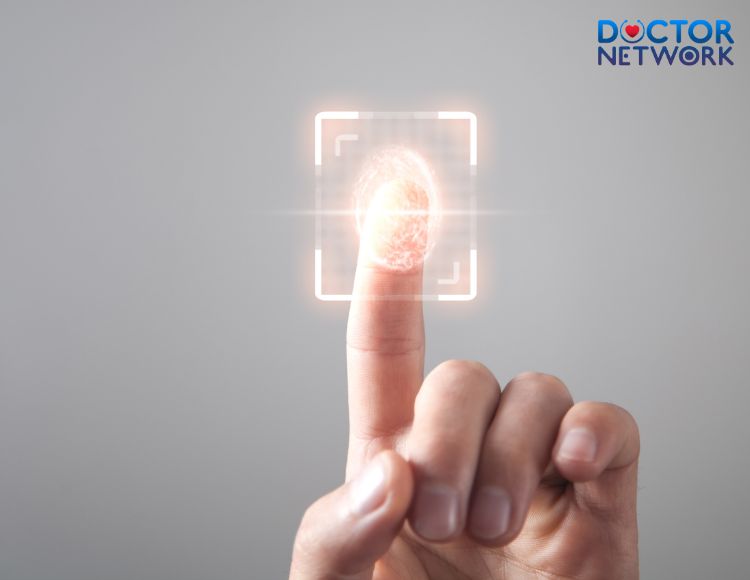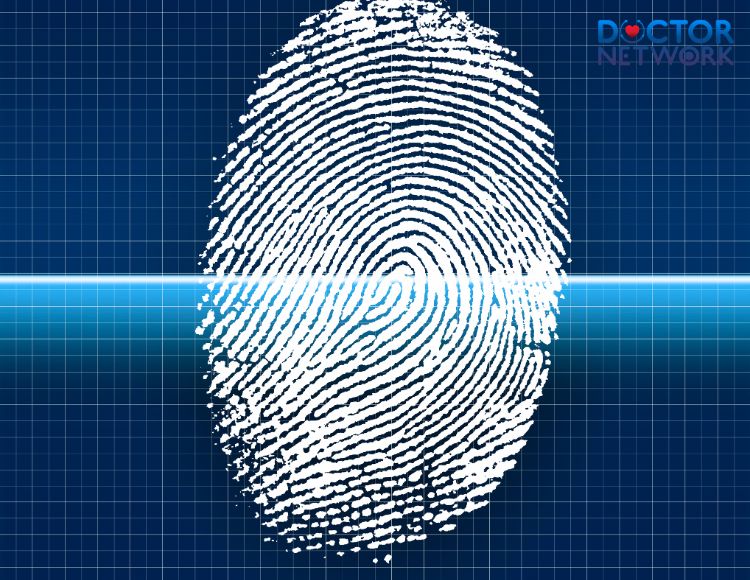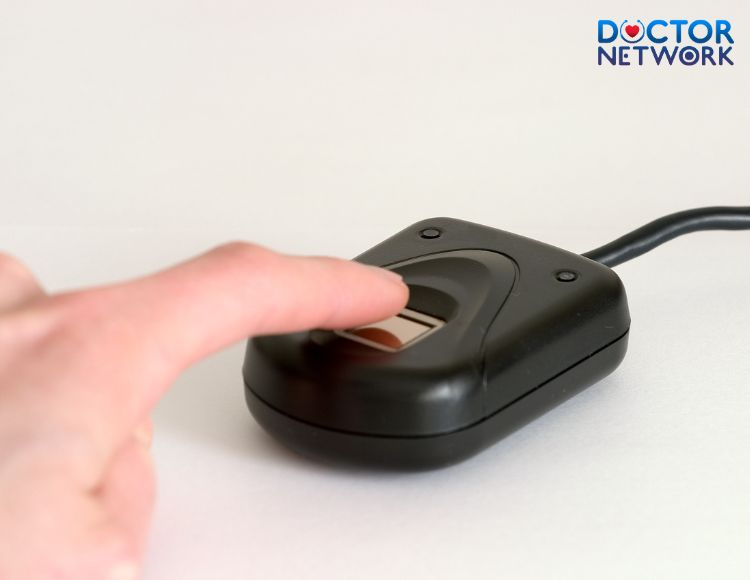Fingerprint biometrics for babies has emerged as a controversial topic in child development circles. This cutting-edge technology promises to unlock insights into a child’s innate talents and potential challenges. However, it also raises significant ethical and practical concerns. This article will explore the pros and cons of “Should I do fingerprint biometrics for my baby“, helping parents make an informed decision about whether this technology is right for their family.
Understanding Fingerprint Biometrics
What is Fingerprint Biometrics?
Fingerprint biometrics is a scientific method that analyzes the unique patterns on a person’s fingertips to identify specific traits. This technology, originally developed for security and identification purposes, has recently been adapted for developmental assessment in children.

Fingerprint biometrics is a method of analyzing fingerprints to assess a person’s potential and personality
The Science Behind Baby Fingerprints
The study of baby fingerprints, known as dermatoglyphics, is based on the premise that fingerprint patterns correlate with certain genetic traits and neurological development. Here’s a brief overview of the key concepts:
| Fingerprint Pattern | Associated Traits |
|---|---|
| Arches | Analytical thinking, focus |
| Loops | Adaptability, communication |
| Whorls | Creativity, leadership |
Potential Applications in Child Development
Proponents of baby fingerprint biometrics claim it can:

Modern technology used in fingerprinting process
- Identify learning styles
- Predict cognitive strengths
- Highlight potential developmental challenges
Benefits of Fingerprint Biometrics for Babies
Early Insight into Strengths and Weaknesses
Fingerprint analysis purportedly offers a window into a child’s natural aptitudes. This information could help parents and educators tailor early learning experiences to maximize a child’s potential.
Tailored Educational Strategies
Armed with biometric data, parents and teachers might create personalized learning plans that align with a child’s innate strengths. For example, a child with fingerprints indicating strong spatial reasoning might benefit from early exposure to building blocks and puzzles.
Early Intervention Opportunities
Advocates argue that fingerprint biometrics can flag potential developmental issues early, allowing for timely intervention. This early action could significantly improve outcomes for children with learning differences or developmental delays.
Concerns and Risks of Baby Fingerprint Biometrics
Privacy and Data Security
The collection and storage of biometric data from infants raise serious privacy concerns. Parents must consider:
- Who has access to the data?
- How long is the data stored?
- What are the potential consequences of a data breach?
Accuracy and Reliability
The scientific validity of using fingerprints to predict a baby’s traits or potential is hotly debated. Critics argue that the correlations between fingerprint patterns and personal characteristics are tenuous at best.
Ethical Considerations
Some experts worry that fingerprint biometrics could lead to:
- Labeling and limiting children’s potential
- Increased anxiety for parents
- Over-reliance on technology in child-rearing
Choosing a Fingerprint Biometrics Professional
If you decide to pursue fingerprint biometrics for your baby, selecting a qualified professional is crucial. Look for:
- Relevant certifications in dermatoglyphics or biometrics
- Experience working specifically with infants and young children
- Transparent communication about the process and limitations
- Affiliation with reputable organizations
Alternatives to Fingerprint Biometrics
For parents hesitant about fingerprint biometrics, there are numerous alternative methods for supporting early childhood development:
| Method | Benefits |
|---|---|
| Play-based learning | Promotes natural skill development |
| Regular pediatric check-ups | Monitors physical and cognitive milestones |
| Parental observation | Provides personalized, ongoing assessment |
Fingerprint biometrics can help parents better understand their children’s strengths, weaknesses, and learning styles
Making an Informed Decision
Ultimately, the decision to pursue fingerprint biometrics for your baby is a personal one. Consider these key factors:
- Your comfort level with the technology
- The potential benefits versus the risks
- Your child’s individual needs and circumstances
- The opinions of trusted healthcare providers and child development experts
Remember, fingerprint biometrics is just one tool in the vast landscape of child development. The most crucial factors in a child’s growth and success remain loving support, enriching experiences, and attentive care from parents and caregivers.
5 frequently asked questions related to “Should I do fingerprint biometrics for my baby?”
At what age can fingerprint biometrics be performed on babies?
Fingerprint biometrics for babies, also known as infant dermatoglyphics, can typically be performed as early as 6 months of age. At this stage, a baby’s fingerprints have fully formed and become stable enough for analysis. However, some practitioners recommend waiting until the child is at least 1 year old for more reliable results. It’s important to note that while fingerprints are fully formed in utero by about 24 weeks of gestation, the tiny size of newborn fingertips can make it challenging to capture clear prints before 6 months.
How accurate are fingerprint biometrics in predicting a baby’s future abilities?
The accuracy of fingerprint biometrics in predicting a baby’s future abilities is a subject of ongoing debate in the scientific community. Proponents of infant dermatoglyphics claim that fingerprint patterns can indicate potential strengths in areas such as logical thinking, creativity, or interpersonal skills. However, it’s crucial to understand that these predictions are based on correlations rather than causation. Many experts in child development and genetics argue that a child’s potential is influenced by a complex interplay of genetic, environmental, and developmental factors, and cannot be accurately predicted by fingerprints alone. Therefore, while fingerprint biometrics might provide interesting insights, they should not be considered definitive or used as the sole basis for making decisions about a child’s education or future.
Are there any risks or side effects associated with baby fingerprint biometrics?
The physical process of capturing a baby’s fingerprints for biometric analysis is generally considered safe and non-invasive. Modern scanning technologies use light or electronic sensors to capture the prints, eliminating the need for ink or other substances that could potentially irritate a baby’s sensitive skin. However, the main risks associated with baby fingerprint biometrics are not physical but rather related to data privacy and psychological impact:
- Data Security: There are concerns about the storage and protection of a child’s biometric data.
- Labeling: There’s a risk of prematurely labeling or categorizing a child based on their fingerprint analysis.
- Parental Anxiety: The results might cause unnecessary worry or over-focus on perceived strengths or weaknesses.
It’s important for parents to carefully consider these potential risks when deciding whether to pursue fingerprint biometrics for their baby.
How does fingerprint biometrics compare to other methods of assessing a baby’s development?
Fingerprint biometrics differs significantly from traditional methods of assessing baby development:
| Assessment Method | Basis | Focus |
|---|---|---|
| Fingerprint Biometrics | Genetic predisposition | Potential future abilities |
| Pediatric Check-ups | Physical examination | Current health and milestones |
| Developmental Screenings | Behavioral observation | Age-appropriate skills |
While pediatric check-ups and developmental screenings are widely accepted and evidence-based practices, fingerprint biometrics remains controversial in the medical community. Traditional methods focus on a child’s current abilities and developmental progress, whereas fingerprint biometrics claims to offer insights into future potential. However, established developmental assessments are typically more comprehensive, considering various factors such as environment, nutrition, and social interactions, which are crucial in child development but not reflected in fingerprint patterns.
What information can fingerprint biometrics provide about my baby?
Proponents of baby fingerprint biometrics claim that this analysis can provide various insights about a child’s potential, including:
- Learning style preferences (e.g., visual, auditory, kinesthetic)
- Cognitive strengths (e.g., logical-mathematical, linguistic, spatial)
- Personality traits (e.g., introversion/extroversion, adaptability)
- Potential talents or aptitudes in specific areas
However, it’s crucial to approach these claims with caution. The scientific community has not reached a consensus on the validity of these predictions. Many child development experts emphasize that a child’s abilities and personality are shaped by a complex interaction of genetics, environment, experiences, and individual choices over time. Therefore, while fingerprint biometrics might offer interesting possibilities, it should not be seen as a definitive guide to a child’s future. Parents should consider this information as one small piece of the puzzle in understanding and nurturing their child’s unique potential.
References:
https://www.ncbi.nlm.nih.gov/pmc/articles/PMC6667827/
https://www.dei.ac.in/dei/edei/files/Infant%20finger%20printing%20IEEE%20Prem%20Sewak%20Sudhish.pdf
Kiểm Duyệt Nội Dung
More than 10 years of marketing communications experience in the medical and health field.
Successfully deployed marketing communication activities, content development and social networking channels for hospital partners, clinics, doctors and medical professionals across the country.
More than 6 years of experience in organizing and producing leading prestigious medical programs in Vietnam, in collaboration with Ho Chi Minh City Television (HTV). Typical programs include Nhật Ký Blouse Trắng, Bác Sĩ Nói Gì, Alo Bác Sĩ Nghe, Nhật Ký Hạnh Phúc, Vui Khỏe Cùng Con, Bác Sỹ Mẹ, v.v.
Comprehensive cooperation with hundreds of hospitals and clinics, thousands of doctors and medical experts to join hands in building a medical content and service platform on the Doctor Network application.



























